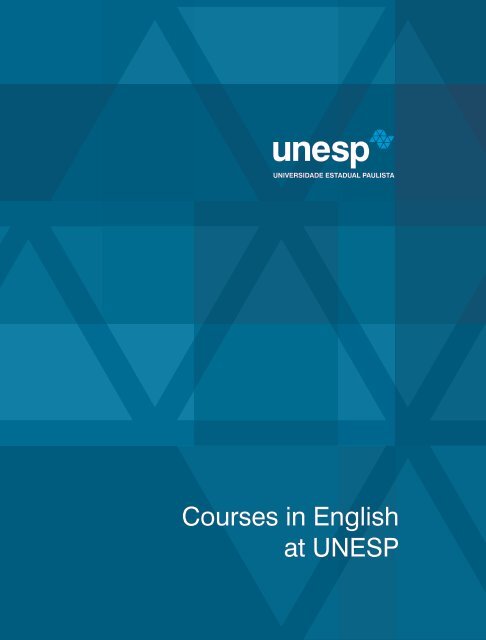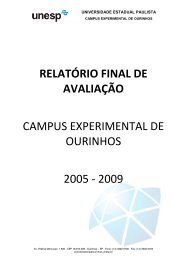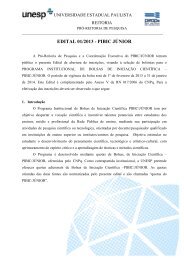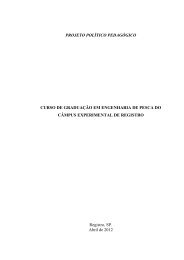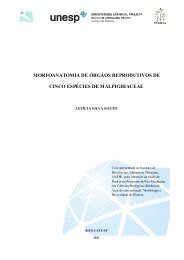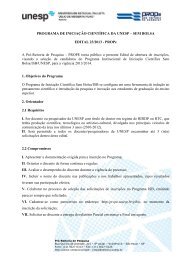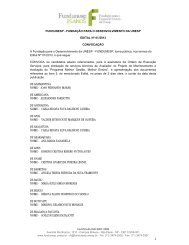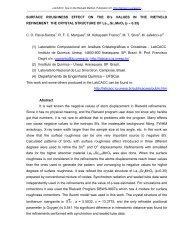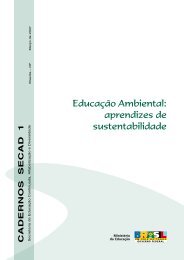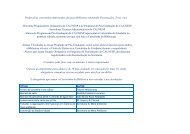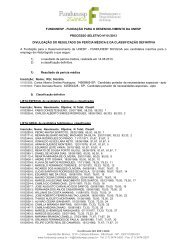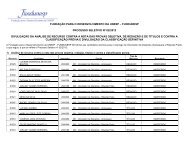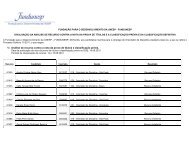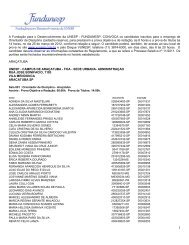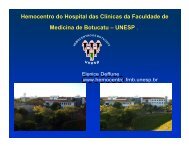Courses in English at UNESP
Courses in English at UNESP
Courses in English at UNESP
You also want an ePaper? Increase the reach of your titles
YUMPU automatically turns print PDFs into web optimized ePapers that Google loves.
<strong>Courses</strong> <strong>in</strong> <strong>English</strong><br />
<strong>at</strong> <strong>UNESP</strong>
<strong>Courses</strong> <strong>in</strong> <strong>English</strong><br />
<strong>at</strong> <strong>UNESP</strong>
Universidade Estadual Paulista – <strong>UNESP</strong> is a public<br />
university with 23 campuses spread throughout the<br />
st<strong>at</strong>e of São Paulo, a major economic power <strong>in</strong> Brazil.<br />
<strong>UNESP</strong> is a research university, ranked among the best<br />
<strong>in</strong> the country receiv<strong>in</strong>g <strong>in</strong>tern<strong>at</strong>ional recognition for the<br />
quality of its research and academic activities.<br />
In order to raise the number of <strong>in</strong>tern<strong>at</strong>ional students <strong>in</strong> our<br />
programs, the university is launch<strong>in</strong>g a new project called <strong>English</strong><br />
Programs <strong>at</strong> <strong>UNESP</strong> – EPU, approach<strong>in</strong>g five different areas:<br />
Agriculture Sciences, Altern<strong>at</strong>ive Energy, Biodiversity, Dentistry as<br />
well Liter<strong>at</strong>ure and L<strong>in</strong>guistics. Each one of these programs will have<br />
a group of discipl<strong>in</strong>es arranged accord<strong>in</strong>g the ECTS (European<br />
Credit Transfer and Accumul<strong>at</strong>ion System), th<strong>at</strong> will sum a total<br />
of 120 ECTS credits and will be bounded to different gradu<strong>at</strong>e<br />
programs of <strong>UNESP</strong>.<br />
Foreign students from undergradu<strong>at</strong>e or gradu<strong>at</strong>e programs should<br />
be <strong>at</strong> Unesp for a m<strong>in</strong>imum period of one semester and maximum<br />
of four. They will have the possibility of develop<strong>in</strong>g a traditional<br />
exchange period, or stay <strong>at</strong> <strong>UNESP</strong> after f<strong>in</strong>ish<strong>in</strong>g their <strong>in</strong>itial period,<br />
bounded to a gradu<strong>at</strong>e program <strong>in</strong> order to f<strong>in</strong>ish their studies and<br />
receive a master degree from <strong>UNESP</strong>. In case of PhD students, they<br />
will be able to keep develop<strong>in</strong>g their research, with a co-tutor, if they<br />
are <strong>in</strong>terested.<br />
Foreign students th<strong>at</strong> will <strong>at</strong>tend the programs should enroll <strong>in</strong> an<br />
<strong>in</strong>tensive Portuguese as a Second Language program th<strong>at</strong> will be<br />
offered by <strong>UNESP</strong>.<br />
<strong>UNESP</strong> will offer annually, for each of the five programs, two master<br />
scholarships with dur<strong>at</strong>ion of two years and a one year doctor<strong>at</strong>e<br />
scholarship with the values currently used by the fund<strong>in</strong>g agencies<br />
<strong>in</strong> Brazil. Students should declare their <strong>in</strong>terest for this scholarship <strong>at</strong><br />
the moment of their applic<strong>at</strong>ion.<br />
Each one of the five programs will count with f<strong>in</strong>ancial resources to<br />
<strong>in</strong>vite annually a foreign professor to particip<strong>at</strong>e <strong>in</strong> the program. He<br />
will have the opportunity of giv<strong>in</strong>g classes for a maximum period of<br />
two months <strong>in</strong> one of the programs <strong>in</strong> order to develop activities with<br />
<strong>UNESP</strong> researchers.<br />
3
Agricultural Sciences<br />
Brazil is one of the largest gra<strong>in</strong> and<br />
me<strong>at</strong> produc<strong>in</strong>g countries <strong>in</strong> the<br />
world. Thus, the discipl<strong>in</strong>es offered<br />
aim <strong>at</strong> engag<strong>in</strong>g students <strong>in</strong> several<br />
aspects rel<strong>at</strong>ed to susta<strong>in</strong>able<br />
agricultural and animal production<br />
<strong>in</strong> the tropics. Students will have<br />
also the opportunity of study<strong>in</strong>g <strong>in</strong><br />
different <strong>UNESP</strong> campuses and,<br />
therefore, ga<strong>in</strong> knowledge on different<br />
production and research approaches<br />
<strong>in</strong> agricultural sciences <strong>in</strong> Brazil.<br />
Discipl<strong>in</strong>es of the program<br />
• Biological Evalu<strong>at</strong>ion Of Feeds<br />
And Nutritional Requirements For<br />
Rum<strong>in</strong>ants<br />
• Breed<strong>in</strong>g Autogamous Crops<br />
• Dairy Science And Technology<br />
• Ecophysiology Of Bioenergy Crops<br />
• Eng<strong>in</strong>eer<strong>in</strong>g Properties Of Food<br />
M<strong>at</strong>erials<br />
• Evolution Of Plant P<strong>at</strong>hogens In<br />
Agriculture<br />
• Fish Larviculture<br />
• Measur<strong>in</strong>g Susta<strong>in</strong>ability In Agricultural<br />
Systems<br />
• Observ<strong>in</strong>g And Measur<strong>in</strong>g Animal<br />
Behaviour<br />
• Optimiz<strong>in</strong>g Applic<strong>at</strong>ion And<br />
Environmental Dynamics Of Pesticides<br />
• Professional Development And<br />
Scientific Ethics<br />
• Seed Biology And Physiology<br />
• Topics On Agriculture And<br />
Development<br />
• Understand<strong>in</strong>g Genes, Genetics And<br />
Genomics: New W<strong>in</strong>dows Opened In<br />
Agricultural Sciences<br />
Coord<strong>in</strong><strong>at</strong>or<br />
Odair A. Fernandes<br />
oafernandes@fcav.unesp.br<br />
5
Altern<strong>at</strong>ive Energy<br />
This theme wil br<strong>in</strong>g the most upd<strong>at</strong>ed<br />
and relevant issues regard<strong>in</strong>g<br />
Brazilian research <strong>in</strong> energy obta<strong>in</strong>ed<br />
by biomass and other renewable<br />
sources. Choos<strong>in</strong>g this theme,<br />
the students will study topics like<br />
technological development rel<strong>at</strong>ed<br />
to energy storage by us<strong>in</strong>g smart<br />
m<strong>at</strong>erials, autom<strong>at</strong>ion and control of<br />
power systems, efficiency <strong>in</strong> energy<br />
use, technological <strong>in</strong>nov<strong>at</strong>ion for<br />
altern<strong>at</strong>ive energies, with special<br />
<strong>at</strong>tention to those th<strong>at</strong> demonstr<strong>at</strong>e<br />
gre<strong>at</strong>er environmental susta<strong>in</strong>ability.<br />
Discipl<strong>in</strong>es of the program<br />
• The Brazilian Electrical Power System:<br />
Opportunities For Energy Conserv<strong>at</strong>ion<br />
• Design Of Experiments And Robust<br />
Design Applied To Renewable<br />
• Efficient Use Of Energy<br />
• Electric Mach<strong>in</strong>es Control<br />
• Electric Power Quality In Distribution<br />
Networks With Renewable Energy<br />
• Fuel Cells<br />
• Geotechnologies Applied To Energy<br />
Management<br />
• Renewable Energy And Electric Power<br />
Gener<strong>at</strong>ion<br />
• Renewable Energy In Microgrids<br />
• Technology Of Process<strong>in</strong>g Agricultural<br />
And Forestry Biomass<br />
• Thermal Systems Optimiz<strong>at</strong>ion<br />
• Utiliz<strong>at</strong>ion Of Agriwastes For The<br />
Production Of Energy And New<br />
M<strong>at</strong>erials<br />
Coord<strong>in</strong><strong>at</strong>or<br />
José Luz Silveira<br />
joseluz@feg.unesp.br<br />
6
Biodiversity<br />
This theme is extremely relevant and<br />
will enable students to engage <strong>in</strong><br />
studies of the most biodiverse coutry<br />
<strong>in</strong> the world. With the courses <strong>in</strong> this<br />
theme, the students will have contact<br />
with topics l<strong>in</strong>ked to research on<br />
biomass and bioenergy production,<br />
production and analysis of biofuels,<br />
automotive eng<strong>in</strong>e applic<strong>at</strong>ions,<br />
economics and social and<br />
environmental impacts of biofuels.<br />
Discipl<strong>in</strong>es of the program<br />
• Bioc<strong>at</strong>alysis<br />
• Ethnobotanic And Conserv<strong>at</strong>ion Of The<br />
Vegetal Biodiversity<br />
• Methods In Microbial Ecology<br />
• Photosynthesis, Agronomic Productivity<br />
And Ecophysiology Of N<strong>at</strong>ive And<br />
Cultiv<strong>at</strong>ed Tropical Plant Species<br />
• Pr<strong>in</strong>ciples Of Phylogenetic System<strong>at</strong>ics<br />
• Stress And Immunity<br />
• Susta<strong>in</strong>able Exploit<strong>at</strong>ion Of Biodiversity<br />
• The Invisible Beauty Of Biodiversity<br />
Coord<strong>in</strong><strong>at</strong>or<br />
Wagner Vilegas<br />
vilegasw@clp.unesp.br<br />
7
Dentistry<br />
Brazilian dentistry is considered one<br />
of the most advanced <strong>in</strong> the world.<br />
This group of discipl<strong>in</strong>es will br<strong>in</strong>g<br />
together cl<strong>in</strong>ical and basic science to<br />
address the concepts of dental caries<br />
and other oral <strong>in</strong>fections and their<br />
consequences for understand<strong>in</strong>g the<br />
diseases, the biocomp<strong>at</strong>ibility and<br />
cl<strong>in</strong>ical applic<strong>at</strong>ions of restor<strong>at</strong>ive<br />
m<strong>at</strong>erials and the pr<strong>in</strong>ciples of bone<br />
biology. Upon completion of this<br />
theme, it is expected th<strong>at</strong> the students<br />
will apply the knowledge learned to<br />
the solution of a wide range of oral<br />
diseases.<br />
Discipl<strong>in</strong>es of the program<br />
• Basic And Cl<strong>in</strong>ical Research In Endoperiondontal<br />
Lesions<br />
• Biology Of Regul<strong>at</strong>ion Of Bone<br />
Turnover<br />
• Bone Biology Applied To Dentistry<br />
• Cariology<br />
• Cl<strong>in</strong>ical Research In Restor<strong>at</strong>ive<br />
Dentistry<br />
• Cytotoxicity And Biocomp<strong>at</strong>ibility Of<br />
Biom<strong>at</strong>erials Used In Dentistry<br />
• Direct Adhesive Restaur<strong>at</strong>ions<br />
• Integr<strong>at</strong><strong>in</strong>g New Molecular Insights Into<br />
Cl<strong>in</strong>ical Aspects Of Hostmicrobial In<br />
Infectious Oral Diseases<br />
• Pulp And Perialpical Tre<strong>at</strong>ment<br />
(Endodontics)<br />
• Science Of Bond<strong>in</strong>g In Restor<strong>at</strong>ive<br />
Dentistry<br />
Coord<strong>in</strong><strong>at</strong>or<br />
Carlos Eduardo Vergani<br />
vergani@foar.unesp.br<br />
8
Liter<strong>at</strong>ure and L<strong>in</strong>guistiCS<br />
This Program aims <strong>at</strong> explor<strong>in</strong>g a<br />
wide range of topics <strong>in</strong> Portuguese<br />
Language, Brazilian Liter<strong>at</strong>ure,<br />
Liter<strong>at</strong>ures <strong>in</strong> <strong>English</strong>, Compar<strong>at</strong>ive<br />
Liter<strong>at</strong>ure, Transl<strong>at</strong>ion Studies,<br />
Cultural Studies. The courses will<br />
focus on issues such as discursive<br />
and textual structure of Portuguese<br />
Language, genre, teach<strong>in</strong>g/learn<strong>in</strong>g<br />
languages, literary theory, transl<strong>at</strong>ion<br />
theory.<br />
Discipl<strong>in</strong>es of the program<br />
• Elizabeth Bishop: Brazil Through The<br />
Eyes Of An American Poet<br />
• The Fiction Genre Of Parable<br />
• Introduction To Gradu<strong>at</strong>e Studies In<br />
Compar<strong>at</strong>ive Liter<strong>at</strong>ure<br />
• An Introduction To Modern<br />
Hermeneutics: Philological And Literary<br />
Interpret<strong>at</strong>ion<br />
• Language Awareness And Implic<strong>at</strong>ions<br />
For Teach<strong>in</strong>g, Learn<strong>in</strong>g And<br />
Instructional Interaction<br />
• Language Policy<br />
• L<strong>in</strong>guistic Elements To The Liter<strong>at</strong>y Text<br />
• The Literary Reception Of Walt Whitman<br />
In Brazil<br />
• Liter<strong>at</strong>ure And History<br />
• Liter<strong>at</strong>ure In Early Childhood<br />
• Perspectives On Typology<br />
• Postmodernism And Cultural Studies<br />
• Pr<strong>in</strong>ciples For Scientific Research<br />
Methodology<br />
• Read<strong>in</strong>g Brazil Through Liter<strong>at</strong>ure<br />
• Read<strong>in</strong>g Three Novels: The Mill On The<br />
Floss By Geoge Eliot, The Voyage Out<br />
By Virg<strong>in</strong>ia Woolf And Near To The Wild<br />
Heart [Perto Do Coração Selvagem] By<br />
Clarice Lispector<br />
• Sem<strong>in</strong>ars In Academic <strong>English</strong>: Giv<strong>in</strong>g<br />
Present<strong>at</strong>ions<br />
• Spoken Language: Research<br />
Perspectives And Pr<strong>in</strong>ciples In Foreign<br />
Language Learn<strong>in</strong>g And Teach<strong>in</strong>g<br />
• The The<strong>at</strong>re: Theory And Practice<br />
• Transl<strong>at</strong>ion Theory And Research<br />
Methods In Transl<strong>at</strong>ion Studies<br />
Coord<strong>in</strong><strong>at</strong>or<br />
Giséle Manganelli Fernandes<br />
gisele@ibilce.unesp.br<br />
9
In all these topics <strong>UNESP</strong> has a high level of scientific competence.<br />
The courses will be form<strong>at</strong>ted observ<strong>in</strong>g strict academic criteria<br />
for full recognition of credits obta<strong>in</strong>ed <strong>at</strong> <strong>UNESP</strong>. Standard<br />
requirements set by the European Commission for academic<br />
recognition of study periods abroad European Credit Transfer<br />
System – ECTS will be considered.<br />
CEU will accept undergradu<strong>at</strong>e, master’s and PhD students. All<br />
students must register to <strong>at</strong>tend courses <strong>in</strong> a s<strong>in</strong>gle theme and<br />
may use the courses as part of their academic exchange program.<br />
Dur<strong>in</strong>g their stay <strong>in</strong> Brazil, <strong>UNESP</strong> will offer a course of Portuguese<br />
as a foreign language to enable better <strong>in</strong>tegr<strong>at</strong>ion.<br />
In addition, foreign students who wish to <strong>at</strong>tend a regular master<br />
course <strong>at</strong> <strong>UNESP</strong> will be eligible for scholarships provided by the<br />
program. In this case, these students need to stay for <strong>at</strong> least a<br />
year and a half tak<strong>in</strong>g courses <strong>in</strong> <strong>English</strong> as well as mand<strong>at</strong>ory<br />
courses from the regular gradu<strong>at</strong>e programs. PhD students who<br />
wish to <strong>at</strong>tend the courses <strong>in</strong> <strong>English</strong> language could also apply for<br />
scholarships and start jo<strong>in</strong>t research with Unesp faculty members.<br />
These students will be registered <strong>in</strong> our regular gradu<strong>at</strong>e programs.<br />
<strong>UNESP</strong> like all public universities <strong>in</strong> Brazil does not charge tuition<br />
and other fees of their students and foreign students particip<strong>at</strong><strong>in</strong>g <strong>in</strong><br />
our courses are exempted as well.<br />
10
Why Choose Brazil and São Paulo St<strong>at</strong>e for an Academic Exchange<br />
Go<strong>in</strong>g through a special moment <strong>in</strong> its history of economic, <strong>in</strong>stitutional and social<br />
development Brazil is the second economy <strong>in</strong> the Americas, only beh<strong>in</strong>d the United St<strong>at</strong>es<br />
and positioned among the seven largest world economies.<br />
The Brazilian economy is established <strong>in</strong> a rich and competitive market. The discoveries made<br />
<strong>in</strong> the Pre-Salt raised the country to a new oil reserve and production level, to a position of<br />
prom<strong>in</strong>ence <strong>in</strong> the world. Agriculture, m<strong>in</strong><strong>in</strong>g, manufactur<strong>in</strong>g (automobiles, aircrafts, electrical<br />
and electronic equipment, textile/apparel, etc.), large sized trade and product distribution<br />
networks, <strong>in</strong> addition to the services sector, provide excellent growth opportunities for<br />
entrepreneurs, as well as for tra<strong>in</strong>ed and enthusiastic professionals.<br />
Students choos<strong>in</strong>g Brazilian universities to develop their academic educ<strong>at</strong>ion will f<strong>in</strong>d<br />
undergradu<strong>at</strong>e and gradu<strong>at</strong>e level excellence centers, besides relevant areas to develop<br />
globally recognized researches and public outreach centers of major relevance. Above all,<br />
these students will be able to enjoy the decanted courtesy of Brazilian people to theirs visitors,<br />
the n<strong>at</strong>ural ability to make friends and the opportunity to become partners <strong>in</strong> the journey of<br />
transform<strong>in</strong>g Brazil, <strong>in</strong> the next ten years, <strong>in</strong>to one of the top five economies on the planet.<br />
The economy of the st<strong>at</strong>e of São Paulo is the most developed and powerful <strong>in</strong> Brazil,<br />
record<strong>in</strong>g 33.9% of the total Brazilian GDP. There are 645 cities, distributed <strong>in</strong> almost 250<br />
thousand square kilometers – area slightly larger than the United K<strong>in</strong>gdom – where there<br />
are over 41 million <strong>in</strong>habitants. The region around its st<strong>at</strong>e capital, the city of São Paulo, is<br />
considered the sixth largest urban agglomer<strong>at</strong>ion <strong>in</strong> the world, compris<strong>in</strong>g about 20 million<br />
<strong>in</strong>habitants. Its popul<strong>at</strong>ion is the most diverse of the country. Initially dom<strong>in</strong><strong>at</strong>ed by the<br />
Portuguese discoverers, São Paulo received people from Africa, reta<strong>in</strong>ed the Amer<strong>in</strong>dians<br />
and from the mid-1800 received Italian, Arab, Japanese, Spanish, German, Jew and more<br />
recently, Korean and Ch<strong>in</strong>ese immigrants. Thus, it became a cosmopolitanism model: <strong>in</strong><br />
the capital of the st<strong>at</strong>e of São Paulo, immigrants and their descendants live and work <strong>in</strong><br />
complete harmony. Be<strong>in</strong>g the most developed st<strong>at</strong>e <strong>in</strong> Brazil, São Paulo is the ma<strong>in</strong> center of<br />
the Mercosur economy. The major n<strong>at</strong>ional and mult<strong>in</strong><strong>at</strong>ional economic groups concern<strong>in</strong>g<br />
<strong>in</strong>dustrial companies, farm<strong>in</strong>g and services are <strong>in</strong>stalled <strong>in</strong> modern build<strong>in</strong>gs th<strong>at</strong> represent<br />
the advanced Brazilian architecture <strong>in</strong> one of the fastest grow<strong>in</strong>g cities <strong>in</strong> the world. The st<strong>at</strong>e<br />
also concentr<strong>at</strong>es the most important portion of the ethanol fuel <strong>in</strong>dustry <strong>in</strong> the country.<br />
11
AREX<br />
Assessoria de Relações Externas<br />
PROPG<br />
PRÓ-REITORIA DE PÓS-GRADUAÇÃO<br />
Sao Paulo St<strong>at</strong>e University | <strong>UNESP</strong><br />
Intern<strong>at</strong>ional Office<br />
Rua Quir<strong>in</strong>o de Andrade, 215 - Centro<br />
São Paulo, SP, Brasil | 01049-010<br />
http://www.unesp.br/en


